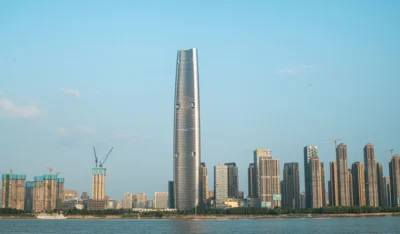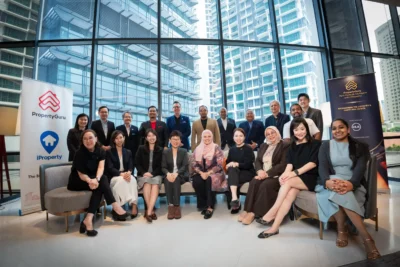10 things all ultra high-net-worth investors should know
Wealth-X co-founder David Friedman shares his insights on wealth intelligence, growth strategies and chips in on the ‘luxury’ debate

Noted author, speaker on ultra-high-net-worth (UHNW) business development practices, real estate strategies consultant, family man, and advocate of philosophical debates, David Friedman is a highly-experienced top executive who regularly globetrots to attend business meetings with VVIPs or to give his opinions on a wide variety of topics involving the world’s ultra wealthy.
As co-founder and president of Wealth-X, a Singapore-based specialist on wealth intelligence, Friedman, from his base in New York City, heads a 250-member team primarily comprising wealth researchers and analysts located in 13 offices worldwide.
Celebrating its fifth anniversary this year, Wealth-X is steadily making a name for itself as a global authority and provider of reliable content on the world’s UHNW individuals, including their background, qualified prospects and businesses. Recently, Wealth-X expanded its data collection methods and reach by joining forces with renowned international leaders, such as Swiss-based financial services firm UBS, and real estate brand Sotheby’s International Realty.
Friedman recently took some time off from his busy schedule to speak with us from his home at the High Line in Manhattan, where he lives with his wife and two children.
1. Tell us a little bit about your experience before Wealth-X. Were you always interested in real estate and economics?
I was a dotcom and technology entrepreneur in the late 1990s in Silicon Valley. Then there was a dotcom crash and our company capsized in the crash. At the time I was also doing some consultancy for a close friend who was working at CB Richard Ellis (CBRE), and that was my first introduction to commercial real estate. CBRE had a developer’s strategy – they wanted to create a high-end strategic consulting group to advise their clients not only on the brokerage side and transactions in real estate, but also on where they should be investing around the world. It was this strategy that created the opportunity for me to work for CBRE and the reason I moved to New York City.
I became part of the group that was working with senior executives, and we started to build a consultant group at CBRE that focused on its largest commercial investors, economic development strategies and emerging strategies that related to large capital investments and deployments, specifically around branding and positioning to attract high-growth entities like technology companies.
2. There are already a number of research firms that deal with the world’s wealth. What then inspired you to form Wealth-X?
Most brands are looking for great content. In fact, they are essentially becoming publishers, and to engage their audience they need great content. This is where we come in.
One of the great things about Wealth-X is that we have proprietary data, and it’s data that we’ve created and collected ourselves and manually curated using open source intelligence. That data is a foundation for creating fantastic content on the UHNW market. We can take that data and work with our clients and partners to create really unique and insightful content because, you know, ‘content is the new black’.
3. You recently teamed up with Sotheby’s International Realty to produce a global luxury residential report earlier this year. How did this collaboration come about?
We partner with industry leaders in different sectors to develop very insightful and unique content driven by the proprietary nature of our data. We’ve done this with several different partners: our UHNW report with UBS; our report with a leader in the life insurance sector, NFP; we also did a report about the largest wealth transfer in history; and in the residential luxury real estate sector, we partnered with Sotheby’s.
We’re excited about the joint report with Sotheby’s because it’s the first and only report that targets and deals exclusively with the UHNW world and owner-occupied real estate. Most reports on luxury real estate usually expand the gamut in terms of looking at investments, asset classes and all these different things about developments, but our report was really unique; it’s the only report that is solely focused on the intersection of UHNW individuals and their owner-occupied luxury real estate.
Indonesia is on track to become a UHNW haven in the future, per a Wealth-X study
4. A key finding in the report is that the world’s wealth seems to be shifting to Asia. What are the main factors behind this shift?
It’s interesting because there’s a bit of a paradox going on here. There has indeed been tremendous wealth creation in Asia, but, according to recent press, most of the luxury brands are actually viewing America as the new emerging market in luxury. In fact, many of the largest spenders – if you will – in luxury have declined and there’s been a muting of luxury buying in China. This means that many high-end brands are looking elsewhere, like the United States. People would have never thought Chicago would rank ninth in terms of UHNWIs globally, right? So, yes, there’s tremendous growth and we see trends. For example, I was in Hong Kong and there were stories of young Chinese teenagers spending hundreds of thousands of dollars [on luxury goods>. You hear these stories and there’s now substantial data to back them up, so there’s a mass growth in Asia. But in the short-term, luxury real estate companies and luxury brands continue to look to the US.
[pullquote> We can take that data and work with our clients and partners to create really unique and insightful content because, you know, ‘content is the new black’. [/pullquote>
5. Were there any other interesting institutional findings from this collaboration?
We discovered that the top industry for UHNWIs globally is finance, banking and investment, which accounts for 22.3 percent. Real estate is the second most significant industry at 7.2 percent, just ahead of non-profits at 7 percent. Furthermore, women’s preference for more tangible assets and, in general, a lower risk tolerance explains why they value real estate more than men. We believe that there’s no reason why it should not be equal in the future, but it could take some time for this to be the case. For example, if female UHNWIs were to increase in number every year at a 10 percent rate, and male UHNWIs were to experience zero growth, it would still take until 2034 before the numbers are equal.
6. Do you agree with some experts that technology also influences the growth of some luxury markets, like in Bangalore and Malaysia?
The technology sector is only ever going to increase in the future, although it is still most significant in the US. The effects of the technology industry on luxury in developing markets is therefore having a small, but growing impact. We will need more companies like Alibaba [a Chinese e-commerce website> to be created before the impact is significant.
Ranked ninth in the global UHNW index, Chicago has no reason to be blue
7. Despite the volatility of some markets, why does real estate remain a solid investment for any UHNW individual?
Real estate is a hard asset, which makes it relatively more secure than other investments. It’s also an investment that can be enjoyed today. While the value of super yachts and luxury cars will depreciate; there is, arguably, little pleasure to be derived from looking at your holdings as stocks and shares. That’s why real estate is a popular investment choice for UHNWIs.
8. Aside from the Chinese, which emerging Asian nationalities should we watch out for?
There are lots of potential in Southeast Asia to improve rapidly. Indonesia is a growing economic force that will help create many more UHNWIs, and Myanmar presents a large opportunity for fortunes to be created with the economy continuing to open up. Overall in the near-term, it is still likely that China will drive the growth of UHNWIs in Asia in the next five years.
9. Speaking of expanding in Asia, if you were to buy a luxury condo here, where would it be, and why?
Singapore in my mind seems to be more like San Francisco, whereas Hong Kong tends to be more like New York. It really depends on a lot of different factors. At this stage in my life – I now have my own family and kids – I’d probably opt for Singapore. If I were younger, I’d probably live in Hong Kong where there’s lots of vitality and activity going on.
10. Being the president of a company that deals with the world’s wealth, what to you is ‘luxury’?
Well, this is an interesting question because the definition of “luxury”, I’d say, is one of the biggest debated topics today. There are people that want to define luxury as ‘exclusivity’ – so exclusive, in fact, that no one can afford it. Some folks define it as ‘craftsmanship’. It’s a word that I think would open opportunity for a debate, basically, for lots of different ideas… but personally, I think about luxury as having two sides: One is you learn more about culture – the real brands of luxury have tremendous heritage and history; it’s part of their corporate legacy. The other is about craftsmanship, a skill set that someone learns and they pass it on to someone else. Embedded in my own bias and personal view of the definition of luxury, it’s the idea of intense craftsmanship and training. In other words, you can’t just step right into it. You have to be an apprentice within a tradition in order to get to a place where you’ll be able to do some of the crafts, which would exclude things that are done instantaneously. That’s my own emerging definition of what “luxury” is. It’s an ongoing debate and is certainly open to interpretation.
Recommended
6 developments driving Asia’s green real estate shift
Developers are being incentivised to push a green agenda into daring new realms
The Philippines’ LIMA Estate drives sustainable industrial growth
LIMA Estate models a citywide vision that uplifts workers while appealing to climate-conscious employers
Malaysia property market rebounds with foreign interest and growth
The nation’s property market is stirring to life, fuelled by foreign buyers and major infrastructure drives
China’s renewable energy surge redefines housing norms and development
From exporting solar panels to building entire green-powered neighbourhoods, China’s renewable surge is redefining housing norms









